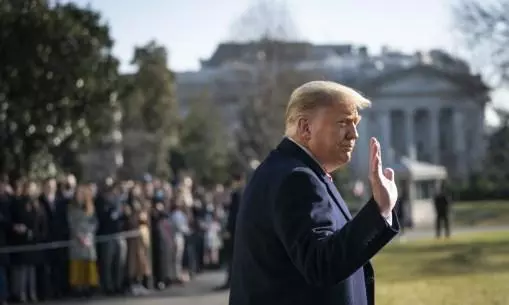
Former US President Donald Trump indicted on racketeering and election fraud charges
text_fieldsU.S. President Donald Trump waves as he walks to Marine One on the South Lawn of the White House on January 12, 2021 in Washington, DC
Washington: Former United States President Donald Trump has been indicted on charges of racketeering and multiple election-related offences after an extensive two-year investigation into his attempts to overturn the 2020 election results in the state of Georgia.
The indictment, which employs legal statutes commonly associated with organised crime cases, marks the fourth legal action taken against the 77-year-old Republican this year, potentially leading to an unprecedented televised trial of a former US president.
The charges, comprising 13 felony counts, represent a significant escalation in the legal challenges facing Trump across various jurisdictions, casting a shadow over his potential pursuit of a second White House term. With ongoing trials scheduled in New York, south Florida, and Washington, this latest indictment introduces an unprecedented scenario where the 2024 presidential election could become as much a matter of courtroom proceedings as the electoral process itself.
Donald Trump, who has faced two impeachment trials during his tenure, is accused of violating Georgia's Racketeer Influenced And Corrupt Organizations (RICO) Act, along with six conspiracy counts related to allegations of forgery, impersonation of a public official, and the submission of false statements and documents. The indictment implicates several co-defendants, including Trump's former personal lawyer Rudy Giuliani and his White House chief of staff Mark Meadows, both of whom are alleged to have played roles in exerting pressure on local legislators following the election.
Georgia, a state in which President Joe Biden secured victory by a margin of fewer than 12,000 votes, presents a substantial challenge to Trump's legal defence. The indictment reflects a broader legal strategy that could impact Trump's ability to exercise presidential powers, even if he were to secure reelection.
RICO statutes, traditionally applied to organised crime cases, are invoked in this legal action. In federal law, RICO allows for the conviction of individuals connected to criminal enterprises. Georgia's interpretation of this law doesn't require proof of the existence of an enterprise.
The investigation into Trump's actions began after he contacted Georgia officials shortly before leaving office, urging them to "find" enough votes to overturn Biden's victory in the state. A special grand jury convened by District Attorney Fani Willis recommended a series of felony charges after hearing testimony from approximately 75 witnesses.
Willis alleges that Trump's team collaborated with local Republicans to orchestrate a scheme involving the replacement of legitimate "electors" with fraudulent ones, casting doubt on the integrity of Georgia's electoral process.
While Trump has already faced numerous federal charges related to his efforts to undermine the election, this latest indictment further adds to his legal battles. The former president maintains his innocence, and it will be up to a jury to determine whether the prosecution can demonstrate criminal intent.























